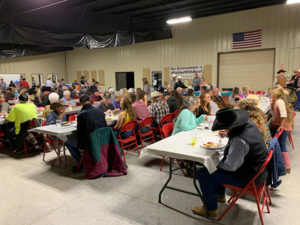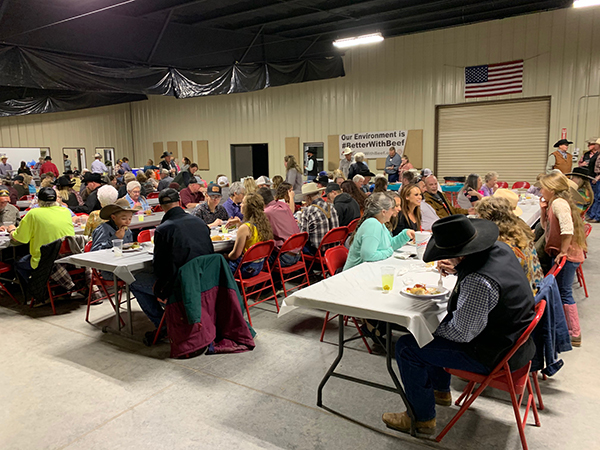By SEAN DOHERTY, Student Reporter

Kim, Colo. — There is evidence of large-scale animal production as early as Ancient Egypt.
Several millennia later, Colorado Governor Jared Polis, a pharaoh in his own mind, issued a proclamation to his people: Don’t eat meat on March 20.
Fortunately, this is America, not Ancient Egypt, and Colorado Ag producers, joined by thousands of supporters around the country, hosted “Meat In Day” instead. Several organizations around the state organized dinners and raised money for charity. My hometown of Kim, Colorado, hosted an event with over 200 people that raised $4,600 for local charities, in a town of 77 people.
It filled my heart with pride to see the Ag community come together and stand with my home state, and I pray this united front stands. Because this is only the beginning, and “Meat Out Day” is an omen of much more dire things to come. I saw Meat Out Day for the gimmicky PR stunt it was as soon as I heard about it, and my suspicions were confirmed through Twitter the day afterward. A Twitter user facetiously thanked Gov. Polis for more free advertising for the beef industry than there had been in years.
Another user pointed out, “Don’t you get it? He created a market share for both veggie-lovers and meat-lovers. That’s marketing.”
Polis then replied, on his verified government account, “Thank you for acknowledging my genius.”
Unfortunately, he is right. In one swift move, Polis appeased his far-left activist base and big Democratic donors, got thousands of people to go out and spend their stimulus checks, and distracted everyone from legislation that would put Colorado on the fast-track to be Bill Gates’s artificial protein utopia.
By itself, Meat Out Day was a political-savvy move by a master politician. But it is a symptom of an extremely dangerous line of thinking perpetuated by Polis and other prominent activists like Gates.
The idea that the first-world has progressed past the need for natural animal proteins and that all of us, in our benevolence, should therefore transition to a vegan or artificial protein diet is peak elitist arrogance. But it leads to real proposed legislation such as Initiative 16, formerly known as the Protect Animals From Unnecessary Suffering Exploitation, or PAUSE, Act. Strange name, considering it virtually outlaws common veterinary procedures and animal husbandry practices.
According to The Fence Post magazine, Initiative 16, authored by activists Alexander Sage and Brent Johannes, is an expansion of prohibitions against cruelty to animals. It is currently awaiting approval from the Colorado title board. After that, the proposition can start to gather the 125,000 signatures needed to appear on the next Colorado ballot.
One part of Initiative 16 seeks to expand the definition of “sexual act with an animal” to include intrusion or penetration into an animal’s anus or genitals with an object or part of a person’s body. The only exception to this statute is “for care to improve the animal’s health.” If the people whose livelihood depends on their livestock are not allowed to decide what is best for their animal’s health, who is? When it comes to livestock care, producers must be able to act quickly; it is literally a matter of life and death. An obvious example of an exception (I would hope) is when a cow needs assistance birthing her calf. On many farms and ranches, like my family’s, the nearest large animal vet is an hour away. A producer cannot wait that long to act if they are going to save the calf’s, and sometimes the mother’s, life. So, cattle producers must reach into the reproductive tract of that cow, and pull the calf out. I know firsthand.
But what about checking for pregnancy? For those who don’t know, the common way to check if a cow is pregnant is to insert a hand and feel for the fetus. Even with massive strides in ultrasound technology and availability, a wand still must be inserted into large animal to receive a reading. Veterinarians agree pregnancy testing is vital to a pregnant cow’s health. But under this initiative, who decides?
Even then, Initiative 16 removes exceptions in animal cruelty statutes for animal husbandry practices, and would ensure that animal cruelty statutes supersede animal care statutes. Meaning, as Colorado Farm Bureau’s Shawn Martini said in an interview with the Fence Post magazine, “Anything you do, even if it is a generally accepted practice endorsed by the American Veterinary Medicine Association, would still make you a criminal animal abuser.”
Initiative 16 also defines “natural lifespans” for certain species of livestock, and seeks to prohibit harvest of these animals until they have reached 25% of their lifespan. For example, according to the authors of the bill, the natural lifespan of cattle is 20 years, making the minimum harvest age five years. First of all, a cow living to 20 years old would be a miracle in the best production setting. Second, by the time cattle reach age 5, their economic value is slim to none. Third, with slaughter outlawed, feedlots and packing houses will move to neighboring states, and as a result food costs go up and food availability goes down.
And little towns, like my hometown, will dry up and blow away.
Polis publicly opposes the initiative, but he is indirectly connected.
First Gentleman Marlon Reis sits as a board member of Luvin Arms Animal Sanctuary, a non-profit animal sanctuary for abused or neglected farmed animals, where Sage, co-author of the PAUSE Act, volunteers.
So maybe we should ask the first gentleman if he supports legislation that would not only wipe out jobs, but eradicate communities? Legislation that would erase generational legacies and destroy families?
The divide between agriculture producers and the average consumer was already vast.
But propaganda attacking the agriculture industry spouted by regressive activists furthers the divide exponentially, and legislation like Initiative 16 could make it too expansive to cross.
The only way to stretch across this divide is to recognize how fortunate we are to have the option of a vegan diet or to choose artificial protein.
Let’s support a shrinking number of farmers and ranchers that continue to feed a growing population with less land, fewer animals and higher costs.
So chow down on that quinoa, order that Impossible Whopper, or grill up some juicy rib-eyes.
And if you want to know more about what you’re eating, don’t ask an activist; ask a farmer.

